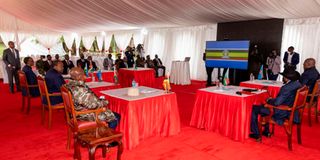Uhuru hosts high-level talks to end war in DRC

President Uhuru Kenyatta with his East African Community counterparts Yoweri Museveni (Uganda), Paul Kagame (Rwanda), Evariste Ndayishimiye (Burundi), Salva Kiir Mayardit (South Sudan) and Felix Tshisekedi (DR Congo) at State House, Nairobi.
President Uhuru Kenyatta yesterday hosted five presidents for a meeting seeking an end to the war in eastern Democratic Republic of Congo (DRC).
Presidents Yoweri Museveni (Uganda), Paul Kagame (Rwanda), Evariste Ndayishimiye (Burundi), Felix Tshisekedi (DRC) and Salva Kiir Mayardit (South Sudan) attended the peace talks at State House, Nairobi.
This was the third East Africa Community Heads of State high-level meeting on the security crisis that has raised tensions between neighbours Rwanda and DRC, even as deployment of a regional peace keeping force is considered.
It came a day after regional military chiefs met in Nairobi following President Kenyatta’s directive last Wednesday to finalise preparations for the activation of the East African regional force to quell the violence in the DRC.
President Kenyatta hosted the peace talks in his capacity as the chairperson of EAC and co-convenor of the peace process.
Tanzania’s President Samia Suluhu Hassan was represented by the country’s envoy to Kenya, High Commissioner John Stephen Simbachawene.
President Museveni, shortly after the closed-door meeting, pointed out the need for the EAC to work jointly to effectively deal with the wave of violence and insecurity currently being witnessed in DRC.
“The problems affecting the region, like the crisis in Congo, need a collective approach from all regional members of the East African Community. We must insist on working together because these people have suffered a lot,” President Museveni posted on his Twitter account.
A communique released by State House last evening indicated the regional leaders approved the deployment of the regional force and called for an unconditional ceasefire.
The regional force received its operational mandate and detailed its operational structure for the four Heads of State, according to the statement.
Chief of Defence Forces of Kenya, General Robert Kibochi, who is the Chairman of the Committee of East African Community Chiefs of Defence Forces, gave the detailed military brief.
“The brief defined the problem, highlighted the threat analysis, Concept of Operations (CONOPs), Status of Forces Agreement (SOFA), Rules of Engagement (ROE) and other legal and technical regulations to facilitate the operationalisation of the Regional Force and its various operational arms.
“The Heads of State accepted and adopted the CONOPs, SOFA and ROE as presented by the Chiefs of Defence Forces for immediate implementation. In doing so, the Heads of State instructed that the Regional Force should in cooperation with the military and administrative forces of the DRC seek to stabilise and secure the peace an in the DRC. The Regional Force should also cooperate in implementation of the disarmament and demobilisation process,” read the statement.
Even as the Heads of State met yesterday, focus remained on President Tshisekedi and his neighbour, President Kagame, who have not been seeing eye to eye lately.
The meeting between the two leaders would have happened in April when Kenya’s President hosted another meeting aimed at addressing the DRC war but Mr Kagame did not attend the convention that was attended by Mr Ndayishimiye, Mr Museveni and Mr Tshisekedi. Instead, Mr Kagame was represented by his Minister of Foreign Affairs Vincent Biruta.
It is expected that the two leaders will make good of the meeting and restore good relations.
So bad is the relationship between Kinshasa and Kigali that DRC citizens on Twitter, in response to Kenya’s State House update on the meeting in Nairobi, did not mince words in their disdain of the involvement of the Rwandan military in the peace restoration mission in their country. They accused Rwandan soldiers of committing crimes in their country, while some advised their president to leave the EAC immediately.
This comes barely three weeks after Mr Tshisekedi accused Kagame of fueling the war that continues to devastate the North Kivu region in DRC by allegedly backing M23 rebels accused of carrying out atrocities against the locals.
In a swift response to the affront by the rebels who it believed were funded by Kigali, President Tshisekedi barred Rwanda’s national carrier, RwandAir, from operating in DRC, an act that President Kagame, who has constantly denied the allegations of involvement in the DRC’s upheavals, did not take lightly and retaliated by cancelling all of Rwanda’s flights to DRC’s major cities, including its capital Kinshasa, Goma and Lubumbashi.
Last Friday, DRC closed its borders amidst claims that Rwandan soldiers shot dead their Congolese counterpart in unclear circumstances.





